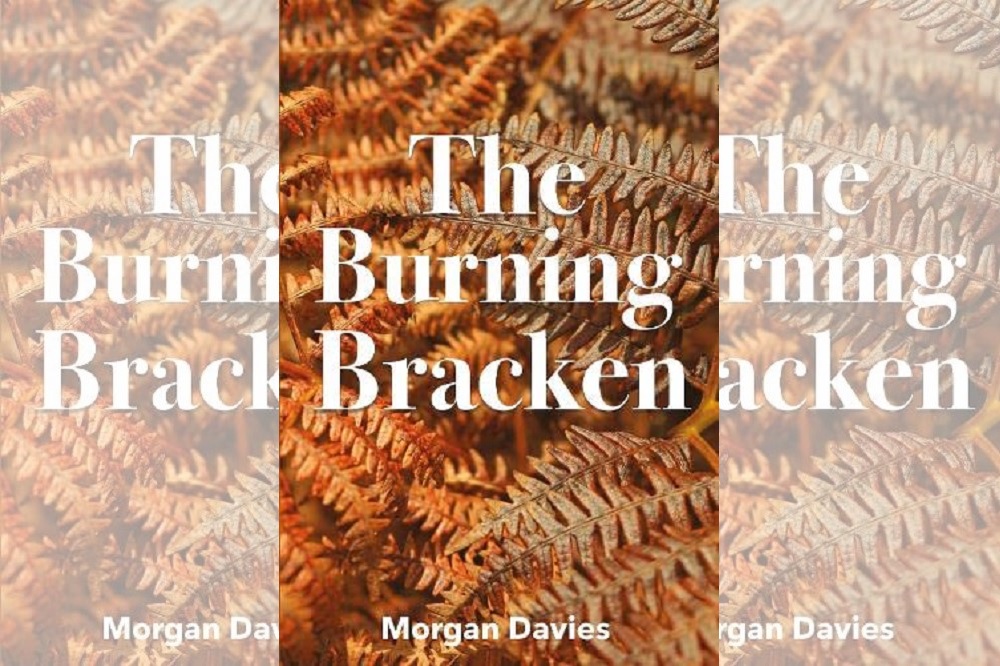Review: The Burning Bracken by Morgan Davies

Jon Gower
The multifarious pressures on the countryside and its people power the multiple plots of this confident debut novel from mid Wales-based writer Morgan Davies.
The heroine of this eco-fiction is Sarah, who has just left her cheating husband, having trashed their home for good measure before setting off into the great unknown of the future without any sense whatsoever of which direction to take.
She fetches up in Hafod Farm, where her luck is in, as there’s a rather derelict cottage free. Owing to its parlous condition the rent is reasonable. She is soon welcomed in by the family there and begins to start to earn her keep by helping out with some of the work.
Authenticity
The writing about farming is steeped in authenticity as the author, not himself a farmer, obviously got his boots on and did the research, such as learning how to drench the ewes:
‘Its head was short and broad and seemed ugly to her, looking more like the head of a bull than a sheep. She felt the strong, animal breath on her face as she held up its head and saw the pink tongue moving under the nozzle of the gun. Letting go, she lunged at the next sheep, determined to grab it unaided this time. It pulled away from her, but she wrestled its head upwards for Evan to spray. The next was easier, as was the following and they began to settle into a rhythm, Sarah breathing hard as she manhandled each of them into place and Evan stooping over to administer each dose.’
A part-time job at a nearby hotel brings further stability to Sarah’s life. Here she encounters an array of local, often red-faced characters such as the lecherous Richard and the memorable Jimmy Rhubarb, who once got into a fight in a market garden and armed himself with a stick of, well you guessed it…
Betweentimes she encounters members of a cultish community with pagan overtones and is gradually seduced by their rituals and pantheist philosophy, that is until an unsavoury incident which prompts the scales to fall from her eyes.
Passionate
There has to be some love interest, of course. Sarah meets the warden of a nature reserve – an intelligent chap with a passionate interest in rewilding beavers in the rivers and pine martens in the forest.
Some nature talks and walks lead to a passionate, albeit brief affair, which all comes a cropper when Rob is invited to dinner at Hafod.
Here he falls out with the redoubtable old farmer Evan because of his passionate and entrenched views about farming’s deleterious effect on the environment. As a consequence Sarah and Rob abruptly part company.
But there’s precious little time for Sarah to lick her emotional wounds as a virus is about to infect the whole of the countryside, leading to the enforced culls of livestock and to the terrible sight of burning pyres of dead bodies, reminiscent of the visitation of foot-and-mouth disease to Wales in 2001.
Deep bonds
It all serves to underline the precariousness of farming and also to the deep bonds between the farmer and his animals.
As you can see there’s a lot going on in this novel, which charts the fissures and fracturelines in rural communities at a time when they’re under all sorts of pressures.
It’s a book of strongly drawn characters and crisply focused descriptions of nature and landscape.
‘A stream prised the woods apart at the gorge and the water became bolder with the steepness of the land, cutting louder and deeper into the earth.’
In amongst the spoil heaps of former mineral workings Sarah encounters a ‘deep tear in the landscape. As she rounded the corner, the fissure broadened, and a fine grey spoil began to bleed from its sides. She was walking now on loose stone, and as she pressed on, the land suddenly opened up like a leaden sea…’
Changing seasons
The textures of the land as well as the pulse and colours of the changing seasons show the passage of time among the sheepfolds and hedgerows, from the quiver of daffodil petals to the burning bracken of the title.
Spring means ‘The hills were awake with the movement of beasts as they pawed at the ground in their millions, their udders swollen with a liquid love, knowing the life inside them. Then, in high summer ‘the hedgerow frothed with blossom, sheltering the swaying heads of cow parsley and the stitchwort that grew beneath them.’
But for all the seasonality and the timeliness of the writing, this deftly constructed and superbly well-told story is ultimately about the impermanence of people as opposed to the permanence of the land, the way its contours and geology, its rivers and its hills are ultimately beyond our ken, are ‘closed forever from the human mind.’
The Burning Bracken by Morgan Davies is published by Victorina Press and is available from all good bookshops.
Support our Nation today
For the price of a cup of coffee a month you can help us create an independent, not-for-profit, national news service for the people of Wales, by the people of Wales.






